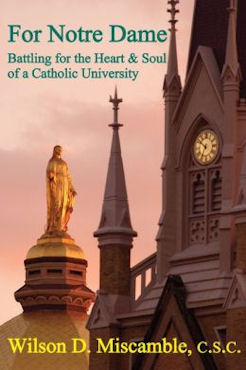
|
Posted October 9, 2013
Book: For Notre Dame: Battling for the Heart and Soul of a Catholic University Author: Wilson D. Miscamble, C.S.C. St. Augustine's Press, South Bend, Indiana. 2013. Pp. 232 An Excerpt from the Jacket:
For Notre Dame gathers together the important contributions of a devoted Holy Cross priest to the continuing debate over the mission and identity of the University of Notre Dame. Read together, these essays and addresses by one of the most consistent and committed participants in this ongoing discussion serve to cast vital light on many of the major issues that Notre Dame has confronted in the past two decades. An Excerpt from the Book: Some Advice for Future Catholic Politicians In his first encyclical letter Deus Caritas Est, Pope Benedict XVI reminded us, "Building a just social and civil order, wherein each person receives what is his or her due, is an essential task which every generation must take up anew." This is essentially the work of lay women and men. My hope is that there are numbered among readers of The Rover able women and men who wish to take up the vocation of politics and so to engage in this crucial work. The Church aims to help inform her members in pursuing this vocation, and in this effort Catholic colleges and universities have a special role to play, for they have a treasured intellectual tradition and great wisdom to pass along to their students. Students at schools such as Notre Dame should emerge with a clear understanding of Catholic moral teaching and social doctrine and so be ready to play their part in shaping their society for the good. In the Pastoral Constitution on the Church in the Modern World (Gaudium et Spes), issued in December of 1965, the council fathers at Vatican II addressed the whole issue of Catholics' political participation. They honored the political vocation and conveyed that Christian politicians are called upon to engage the modern world in ways that promote the dignity of each person and the common good. They are to serve within their own domain as "leaven.' They certainly are not to see their political activities as separate from their religious commitments. The council fathers emphasized that "there be no false opposition between professional and social activities on the one part, and religious life on the other." They firmly rejected any compartmentalization of faith and political engagement. . . . .Let me offer some brief counsel, drawn from a number of thoughtful commentators, on how this [the call to serve faithful as Catholic politician] might be done better. I borrow firstly from Mary Ann Glendon, the distinguished Harvard Law professor and former U.S. ambassador to the Vatican . . . . "Religious participants in public debates will not be as effective unless they can speak in terms that are persuasive to men and women of good will --- of all faiths, and of no faith. One will not get far if one preaches only to the converted." The key is to work for what is right and good by persuading others of the rightness and goodness of your objectives. In doing so one must utilize reason accessible to all to clarify the ethical foundations for one's political choices and actions. Table of Contents: Part I: The 1990s: Initial Positions and Arguments Section I: Matters Academic Section II: Matters Pastoral Part II: The Past Decade: Engaging the Issues and Taking Stands Section I: Teaching, learning, research Section II: The Faculty Issue --- Again Section III: Notre Dame: Corporation or Community? Section IV: Controversies Section V: Counsel for Students Section VI: Priesthood and Holy Cross Section VII: Tributes |
|
